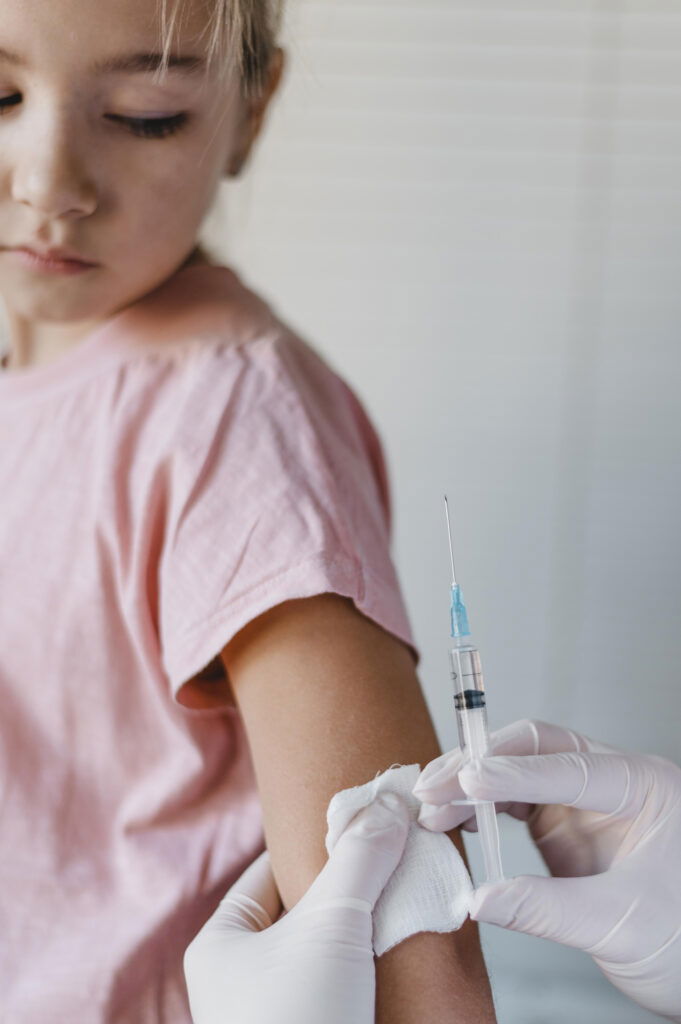Vaccinations – protecting your child and others

By Dr Michelle Wright
Since Edward Jenner successfully vaccinated against smallpox in 1796, vaccinations have become medicine’s best way to safely protect your child from a multitude of infectious diseases and their possible complications.
Vaccinations work by injecting a small dose of a weakened or inactive part of a bacteria or virus (the antigen), or the ‘code’ for producing that antigen. This injection will not lead to infection or symptoms, but it will allow the person’s body to make antibodies and develop an immune reaction against that infection. If they are exposed to that bacteria or virus in the future, their body ‘remembers’ the germ that they were vaccinated against, and their antibodies and immune cells are launched to fight it off. Thus, infection is prevented from taking hold.
Over the years, vaccinations have undoubtedly saved countless lives. And the human body generally reacts very well towards them – only being recommended when the benefits of protection against an infection and its complications significantly outweigh the potential side effects.
When thinking about vaccinations, it is also important to consider the concept of herd immunity. This is a form of immunity when vaccination of a significant proportion of a population (a herd) provides a degree of protection for those people who are not immune to an infection because they are unable to be vaccinated – for example children who are too young, people with immune deficiency problems, or people too unwell to receive vaccines.
If a high percentage of a population is vaccinated, it makes it very difficult for that germ to spread because there are so few susceptible people left for it to infect.

On the contrary, when herd immunity is not sufficient, then outbreaks of infection can occur, and children and adults may die unnecessarily.
The evidence for herd immunity can be demonstrated by the successful eradication of smallpox worldwide and the eradication of polio in many regions. Through the concept of herd immunity, by vaccinating your child, you are not only protecting them, but you are also helping to protect the whole population.
In Switzerland, the Federal Office of Public Health regularly updates their vaccination recommendations after consultation with the Federal Commission for Vaccination, and in collaboration with Swissmedic (the Swiss Agency for Therapeutic Products). Any new available vaccines, any updates on vaccine safety and efficacy, any changes in disease outbreaks and any updates to vaccination guidelines by the World Health Organisation are all taken into consideration.
In this country, it is currently recommended that babies and children have basic vaccinations against:
• Diphtheria, tetanus, and pertussis (also known as whooping cough)
• Poliomyelitis (or polio for short)
• Haemophilus influenzae type B (which can cause meningitis, pneumonia, septicaemia – generalised blood infection – infections of the bones, joints, skin and ears, and epiglottitis – a severe life-threatening infection of the epiglottis, a flap of tissue at the back of the throat that closes off the windpipe while you are eating)
• Hepatitis B
• Pneumococcus (along with Haemophilus influenzae and meningococcus, pneumococci are the main cause of meningitis in children; they can also cause septicaemia, pneumonia, and ear infections)
• Measles, mumps, and rubella (also known as German measles)
• Varicella (or chickenpox)

During the teenage years, vaccination against the human papillomavirus (responsible for most cervical cancers) is recommended. From January 2024, this will be offered to all genders as part of the basic vaccination schedule. Booster doses of some of the earlier childhood vaccinations are also advised during adolescence to ‘reactivate’ immunity memory. Additional (or complementary) vaccinations may be given to children whose parents wish to protect them against some other infections that can lead to rare but potentially fatal illnesses. They include those against meningitis caused by Neisseria meningitidis serogroups B and ACWY which can be given during infancy, with booster doses during adolescence. From January 2024, rotavirus is another complementary vaccination that can be given between the ages of 2 and 4 months.
Compulsory health insurance covers the cost of these vaccinations, except for any deductibles and co-payment. Vaccinations against human papillomavirus are free of charge if carried out as part of cantonal vaccination programmes.
If you have recently moved from another country, it is worth checking your child’s vaccination record and comparing what vaccines they have already received to those recommended here in Switzerland. You can view the 2023 Swiss Vaccination Schedule here in French, German and Italian. The updated schedule for 2024 will be available from the end of March.
If you have any questions, or if you think your child is missing any vaccinations, then visit your paediatrician who will be able to advise you further. There is also a telephone helpline in Switzerland for vaccination advice: 0844 448 448. The consultation is free, but you may need to pay the call charges. Or you can consult www.infovac.ch for further information.
Take some important steps today to protect your child and others.
Disclaimer: This article is for information only and should not be used for the diagnosis and treatment of medical conditions. All reasonable care has been taken in compiling the information but there is no legal warranty made to its accuracy. Consult a doctor or other healthcare professional for diagnosis and treatment of medical conditions. Dr Michelle Wright or HealthFirst is not responsible or liable, directly, or indirectly, for any form of damages whatsoever resulting from the use of the information contained or implied in this article.

